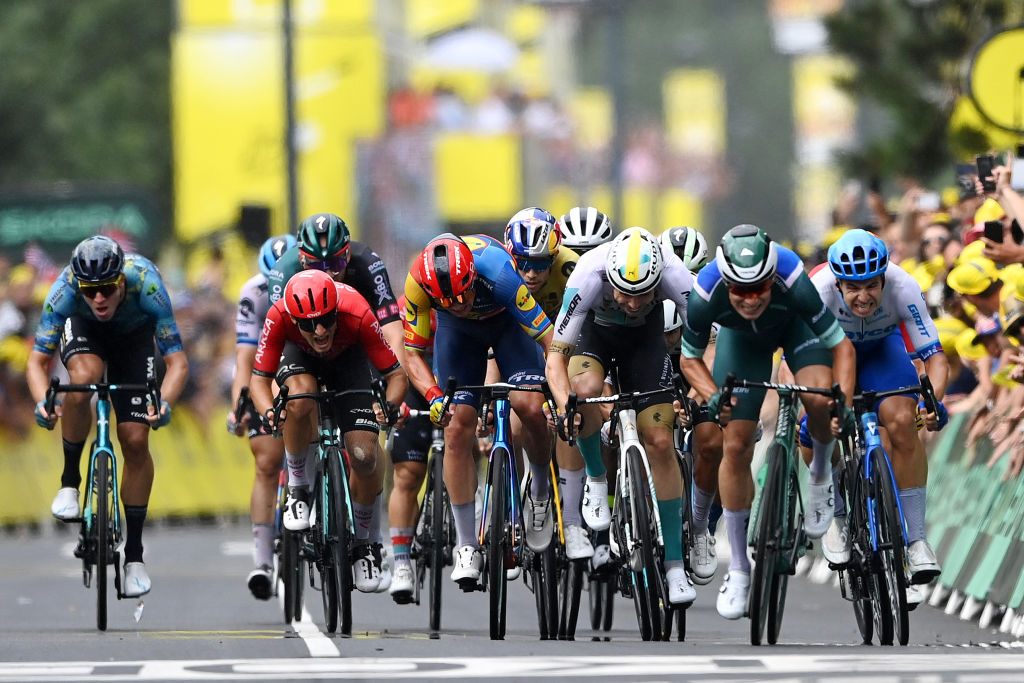Philipsen remains king of the Tour de France sprints despite no Van der Poel leadout
Van de Poel 'could try to win himself on Thursday if he gets over his minor illness' says green jersey leader

Jasper Philipsen has become the 2023 Tour de France sprint steamroller and he continued to flatten the opposition on stage 11 at Moulins on Wednesday, and that was despite the Alpecin-Deceuninck leader lacking his usual star lead-out man, Mathieu van der Poel, who is feeling under the weather.
Prior to easily outpowering Dylan Groenewegen (Jayco-AIUIa) on stage 11, Philipsen had already swept up stages 3, 4 and 7 with Van der Poel as his last man in the dash for the line.
Asked to discuss the effects of the absence of a giant of the sport like Van der Poel from his lead-out duties for Philipsen on Wednesday, the Belgian said, “I can win without him, but of course, he makes it much easier because I could get blocked in.”
“It’s a bit more hectic at the back too, and there’s always a bigger risk of crashing. I’m just happy that this time, I could get on a good wheel to follow with Dylan Groenewegen. He went early, but I could come past him.”
As for if he had anything to prove, as in several of the other sprints there were complaints about him moving his line, Philipsen said, “I always believed I never did anything wrong. This is the Tour de France, of course, they are going to study everything closely.”
Regarding the possible consequences if a rider of the calibre of Van der Poel abandoned, Philipsen played down that idea, saying that “for sure that would be a loss, but he has a lot of ambitions himself.”
“Tomorrow [Thursday] is a big stage, he’s thinking about that one and saving some energy to try to recover from a small sickness. But it’s nothing to worry about.”
Get The Leadout Newsletter
The latest race content, interviews, features, reviews and expert buying guides, direct to your inbox!
Quite apart from the lead-out man and the stage winner, Alpecin-Deceuninck has managed to create a team that is hugely successful in the sprints, with Philipsen explaining, “They have been building the train for a long time and I think this is the first time, here in the Tour, that it’s really paid off."
"But it’s not come out of nowhere, we’ve tried to focus on the sprint stages and do our best with all the riders here.”
Success breeds success and as Philipsen put it, “Being focussed mentally plays a big part in this, but also that we’re having a great Tour. It’s already stage 11, but I don’t feel like that. Our team is just a group of young guys having fun, and if you can win, it’s even more fun of course.”
On the personal front, too, Philipsen recognised there had been some important changes in his approach to training in the last few months. “I’ve been climbing a lot, to be sure I get over the mountains well. I actually train more in the mountains than sprinting,” he revealed.
Perhaps unsurprisingly, Philipsen confirmed that the green jersey is the big goal from hereon in the Tour. “I have lost one sprint, against [Mads] Pedersen [in Limoges - Ed.] and next week will be hard to control, the breakaways could always get away. But for sure the aim is to take it all the way to Paris.”
After taking four out of 11 stages, Philipsen is fast-tracking his way into the history of the sport, and in fact, he is the first Belgian since Tom Steels in 1998 to take four stages in one Tour.
“I’m not that good at history, it was never my favourite subject at school,” Philipsen said. “But for me to be mentioned in the same phrase as Tom Steels is a big achievement. It’s always nice to hear that.”
One opponent who had a chance to make some history in the Tour before he had to abandon with a broken collarbone was Mark Cavendish. But Philipsen said that while the lack of a great opponent like Cavendish was important and made a difference, “it doesn’t make it [winning] any easier.”
The next possible sprint will be in a week’s time into Bourg-en-Bresse after the Tour has tackled both the Jura and the Alps. Barring a major surprise or misfortune, Philipsen will still be the reference point in the bunch sprints to come - and likely make his way even deeper into the Tour’s history books in the process.
Alasdair Fotheringham has been reporting on cycling since 1991. He has covered every Tour de France since 1992 bar one, as well as numerous other bike races of all shapes and sizes, ranging from the Olympic Games in 2008 to the now sadly defunct Subida a Urkiola hill climb in Spain. As well as working for Cyclingnews, he has also written for The Independent, The Guardian, ProCycling, The Express and Reuters.
